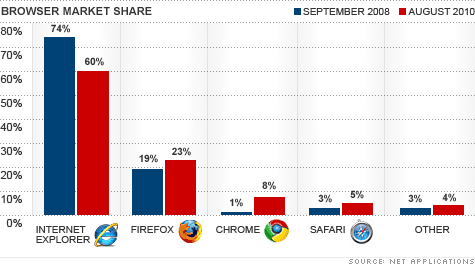
NEW YORK (CNNMoney.com) -- Move over, smartphones: The hottest tech battle right now isn't being fought out in the mobile market, but on old-fashioned PCs.
The browser wars are back.
Once the biggest killer app of them all -- who could forget the Microsoft-vs.-Netscape battle royale? -- the browser is now nearly a commodity. Major innovations like tabbed browsing and smart bookmarks happened almost a decade ago. Most improvements in recent years have focused on security and speed, but load times are now so fast that the enhancements aren't that exciting.
But in the past few months, updates to the most-used browsers -- including Microsoft (MSFT, Fortune 500) Internet Explorer, Mozilla Firefox, Google (GOOG, Fortune 500) Chrome and Apple (AAPL, Fortune 500) Safari -- have their developers once again fighting to out-innovate each other.
That's because a breakthrough Web standard called HTML5 is emerging, and browser makers are practically falling over one another to produce the software that incorporates the most HTML5 support features.
About 90% of Web content is written in HTML code today, according to research firm IDC, and the latest enhancements promise richer, easer-to-use and better looking Web applications.
Though still a work in progress, HTML5 will let developers create in the browser experiences that currently require stand-alone apps or plug-in extensions like Adobe Flash or Microsoft's Silverlight. It supports lightning-fast video, geolocation services and the ability to drag-and-drop items to and from the desktop. It can also be used to build in-browser applications that work offline.
To show what's possible with HTML5, Google recently released "The Wilderness Downtown," a music video using pop-up windows, interactive animations and a Google Maps integration. It works best with Google Chrome, but most users with up-to-date browsers can run at least parts of the site.
Starting Wednesday, that will include early adopters using the Web's most dominant browser. Microsoft is scheduled to publicly release a beta version of Internet Explorer 9 -- its first complete embrace of HTML5, and the company's biggest leap forward in browser technology in years.
IE's market share has slipped about 15 percentage points over the past two years, falling to 60%, according to Net Applications. In that same time, the number-two browser, Firefox, has expanded its turf, while Safari's share has nearly doubled and Chrome's market penetration has shot up nearly seven-fold.
But analysts say the newest Internet Explorer browser has a shot at reversing that trend.
"Internet Explorer has been caught in a time warp, but IE9 brings it up to date," said Al Hilwa, analyst at IDC. "The tide in the browser world could quickly shift back to Microsoft."
The current version of Internet Explorer is noticeably slower than most modern browsers. Despite its deficiencies, Microsoft has maintained its dominance in the browser market mainly because Internet Explorer is packaged with Windows computers -- and more than 90% of PCs are running Windows.
But with its market share falling fast, Microsoft made the decision to embrace change. In addition to adding HTML5 support, IE9 introduces hardware acceleration to improve graphics performance and a handful of other advances that will help it keep pace with its fast-improving rivals.
The biggest advantage of the the near-universal adoption of HTML5 is that it could finally be the Web standard -- meaning developers can write code once that will work across multiple browsers. That means innovators should be able to spend more time developing new products and less time tweaking their creations to account for each browser's persnickety differences.
Of course, that opens the door to a fresh round of feature fights. With IE9, Microsoft -- like other browser makers -- is gathering up partners to build unique offerings like taskbar integrations that will differentiate their browsers. Too much unique "innovation" undoes the advantages of having an industry-wide standard.
"Yes, Microsoft is moving forward with it and that's a good thing," said Ray Valdes, analyst at Gartner. "But differentiation has the risk of adding incompatibilities for users such as we saw 10 years ago during first round of browser wars."
But for now, the bottom line is that fast-paced innovation in the browser space is paying off for users. Even those running Internet Explorer will finally be able to enjoy the faster speeds and richer application capabilities that are sparking a Web development renaissance. ![]()






| Index | Last | Change | % Change |
|---|---|---|---|
| Dow | 32,627.97 | -234.33 | -0.71% |
| Nasdaq | 13,215.24 | 99.07 | 0.76% |
| S&P 500 | 3,913.10 | -2.36 | -0.06% |
| Treasuries | 1.73 | 0.00 | 0.12% |
| Company | Price | Change | % Change |
|---|---|---|---|
| Ford Motor Co | 8.29 | 0.05 | 0.61% |
| Advanced Micro Devic... | 54.59 | 0.70 | 1.30% |
| Cisco Systems Inc | 47.49 | -2.44 | -4.89% |
| General Electric Co | 13.00 | -0.16 | -1.22% |
| Kraft Heinz Co | 27.84 | -2.20 | -7.32% |
|
Bankrupt toy retailer tells bankruptcy court it is looking at possibly reviving the Toys 'R' Us and Babies 'R' Us brands. More |
Land O'Lakes CEO Beth Ford charts her career path, from her first job to becoming the first openly gay CEO at a Fortune 500 company in an interview with CNN's Boss Files. More |
Honda and General Motors are creating a new generation of fully autonomous vehicles. More |
In 1998, Ntsiki Biyela won a scholarship to study wine making. Now she's about to launch her own brand. More |
Whether you hedge inflation or look for a return that outpaces inflation, here's how to prepare. More |